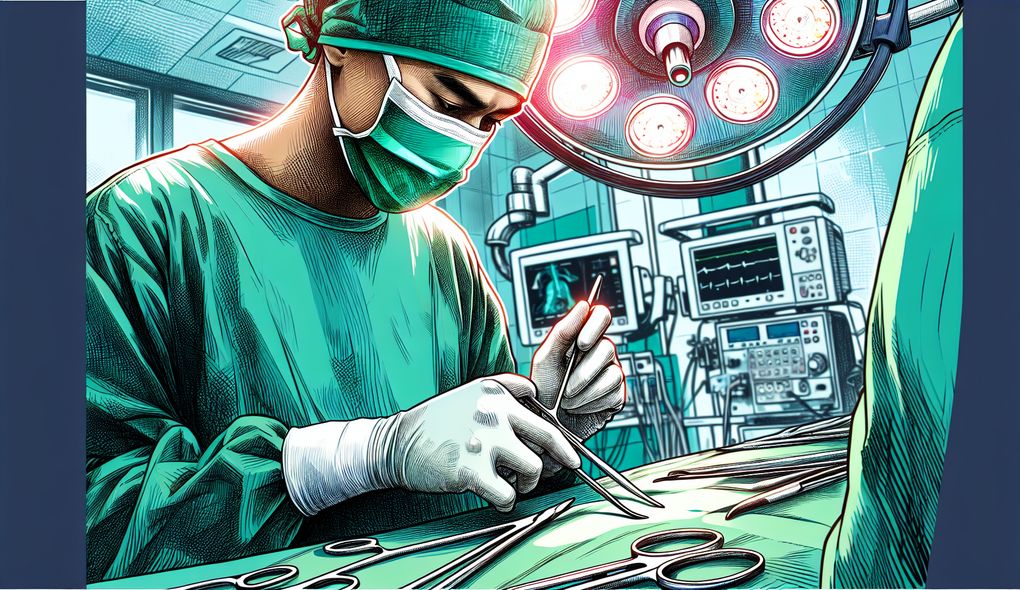How do you prioritize and manage multiple tasks during a surgical procedure?
SENIOR LEVEL

Sample answer to the question:
During a surgical procedure, I prioritize and manage multiple tasks by first assessing the urgency and importance of each task. I create a mental checklist of all the tasks that need to be completed and prioritize them based on the criticality. I communicate with the surgical team to ensure everyone is aware of the tasks and their order of priority. To manage multiple tasks efficiently, I break them down into smaller subtasks and allocate time accordingly. I also make sure to delegate tasks to other team members when appropriate to ensure everything gets done in a timely manner.
Here is a more solid answer:
Prioritizing and managing multiple tasks during a surgical procedure is crucial for ensuring the efficiency and success of the operation. To achieve this, I follow a systematic approach. Firstly, I assess the urgency and criticality of each task. For instance, if there is heavy bleeding, I would prioritize controlling the bleeding over other non-urgent tasks. Secondly, I create a checklist of all the tasks that need to be completed and organize them based on their priority. This helps me stay organized and focused. Thirdly, I communicate effectively with the surgical team, including the surgeon, nurses, and anesthesiologist, to ensure everyone is aware of the tasks and their order of priority. This promotes collaboration and prevents any confusion or duplication of efforts. Additionally, I break down complex tasks into smaller subtasks and allocate time accordingly. This allows for better time management and prevents tasks from being overlooked or rushed. Furthermore, I am not hesitant to delegate tasks to other team members when appropriate. By involving others, I can ensure that all tasks are completed in a timely manner and that the workload is distributed effectively. Lastly, I am skilled in managing stress and staying calm under pressure. This skill helps me maintain focus and make sound decisions even in high-pressure situations during a surgical procedure.
Why is this a more solid answer?
The solid answer provides more specific details on how the candidate prioritizes and manages multiple tasks during a surgical procedure. It includes examples and emphasizes the importance of communication, delegation, and stress management. However, it could benefit from further elaboration on the candidate's past experiences and achievements related to task prioritization and management.
An example of a exceptional answer:
In my 5+ years of experience as a Surgical Technician, I have honed my ability to prioritize and manage multiple tasks during surgical procedures. To effectively handle this challenge, I employ a comprehensive approach. Firstly, I conduct thorough preoperative planning by reviewing the patient's medical records, the surgical procedure, and any specific requirements. This enables me to anticipate the tasks that will need to be completed during the procedure and allocate time accordingly. Secondly, I communicate proactively with the entire surgical team to ensure everyone is on the same page regarding the tasks and their order of priority. For example, I have implemented a visual board in the operating room that outlines the tasks and their status, allowing everyone to stay informed and coordinated. Thirdly, I have developed a system for efficient task delegation. I am adept at recognizing the capabilities and expertise of my colleagues and assigning tasks accordingly. This ensures that tasks are completed by the most qualified team member, optimizing productivity and outcomes. Additionally, I have undergone training in stress management techniques, such as deep breathing exercises and mindfulness, which help me stay calm and focused even in high-pressure situations. Overall, my meticulous approach, effective communication, task delegation skills, and ability to handle stress allow me to prioritize and manage multiple tasks seamlessly during surgical procedures.
Why is this an exceptional answer?
The exceptional answer showcases the candidate's extensive experience and expertise in prioritizing and managing multiple tasks during surgical procedures. It includes specific examples of the candidate's preoperative planning process, communication strategies, task delegation techniques, and stress management skills. The answer demonstrates a high level of competency in all the evaluation areas and aligns with the requirements and responsibilities outlined in the job description.
How to prepare for this question:
- Familiarize yourself with various surgical procedures, operating room protocols, and aseptic techniques to understand the context in which task prioritization and management occur.
- Reflect on past experiences where you successfully handled multiple tasks during surgical procedures. Identify specific strategies or techniques you used to prioritize and manage tasks effectively.
- Develop your communication skills, both verbal and non-verbal, as effective communication is essential when coordinating tasks with the surgical team.
- Practice stress management techniques to enhance your ability to stay calm and focused in high-pressure situations during surgical procedures.
- Consider seeking additional training or certifications in surgical technology and operating room protocols to enhance your knowledge and skills in this field.
What are interviewers evaluating with this question?
- Prioritization
- Time Management
- Communication
- Stress Management

